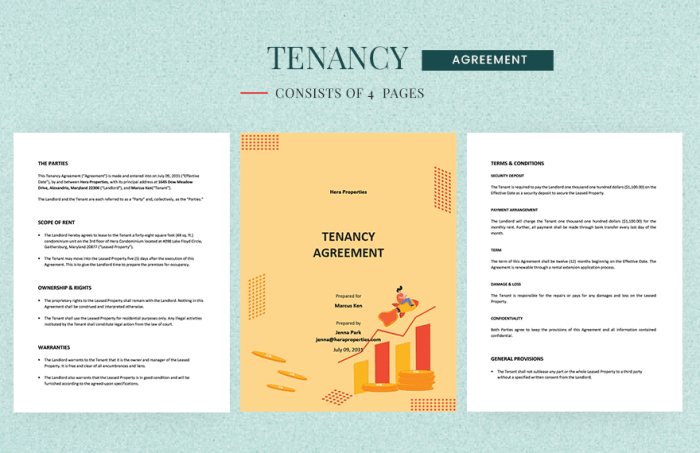House Rent Contract Agreement A Comprehensive Guide
Key Components of a House Rent Contract Agreement
A comprehensive house rent contract agreement safeguards both landlords and tenants. Understanding its key components is crucial for a smooth and legally sound tenancy.
Essential Clauses in a Standard House Rent Contract
Standard house rent contracts typically include clauses defining the rental period, the monthly rent amount, security deposit details, responsibilities for repairs and maintenance, and the process for lease termination. Other important clauses might cover pet policies, subletting permissions, and late payment penalties.
Legal Implications of Omitting Key Clauses
Omitting crucial clauses can lead to disputes and legal complications. For example, the absence of a clear termination clause might result in protracted legal battles regarding eviction or lease renewal. Similarly, unclear stipulations on repairs and maintenance can leave either party vulnerable to financial losses or inconvenience.
Comparison of Lease Agreement Types
Fixed-term leases offer stability for a predetermined period, while month-to-month leases provide greater flexibility but lack the security of a longer-term agreement. The choice depends on individual circumstances and preferences.
Key Clauses and Their Significance, House rent contract agreement
| Clause Name | Description | Legal Implications | Example |
|---|---|---|---|
| Rental Period | Specifies the duration of the lease (e.g., one year, month-to-month). | Determines the notice period required for termination. | “This lease agreement shall commence on October 1, 2024, and continue for a period of twelve (12) months.” |
| Rent Amount | Specifies the monthly rent payable. | Establishes the financial obligations of the tenant. | “Tenant shall pay a monthly rent of $1,500, payable on the first day of each month.” |
| Security Deposit | Amount held by the landlord to cover potential damages. | Protects the landlord from financial losses due to tenant negligence. | “Tenant shall provide a security deposit of $1,500 upon signing this agreement.” |
| Maintenance Responsibilities | Artikels who is responsible for repairs and maintenance. | Clarifies responsibilities and prevents disputes. | “Landlord is responsible for major repairs (e.g., roof leaks), while tenant is responsible for minor repairs (e.g., replacing lightbulbs).” |
Tenant Rights and Responsibilities
Tenants have legal rights and corresponding responsibilities that must be upheld by both parties for a harmonious tenancy.
Tenant Rights Under a Typical House Rent Contract
Tenants generally have the right to quiet enjoyment of the property, a habitable dwelling, and protection from unlawful eviction. They also have rights related to notice periods, access to the property, and the return of their security deposit.
Before signing a house rent contract agreement, carefully review all clauses, especially those concerning lease duration and payment terms. If you’re searching for a property, consider exploring options like those available at house for rent in yorba linda ca , remembering that a thorough understanding of the contract protects both landlord and tenant. Ensure all agreed-upon conditions are clearly stated in the final agreement to avoid future disputes.
Common Tenant Responsibilities
Tenants are typically responsible for paying rent on time, maintaining the cleanliness of the property, adhering to the terms of the lease agreement, and reporting necessary repairs promptly.
Procedures for Addressing Maintenance Issues and Repairs
Most lease agreements Artikel a procedure for reporting repairs. Typically, tenants notify the landlord in writing, detailing the issue. The landlord then has a reasonable timeframe to address the problem. Failure to address urgent repairs may give the tenant legal recourse.
Best Practices for Tenants to Protect Their Rights
- Thoroughly review the lease agreement before signing.
- Document all communication with the landlord.
- Keep copies of all rent payments and repair requests.
- Understand your rights and responsibilities as a tenant.
- Seek legal advice if necessary.
Landlord Rights and Responsibilities
Landlords have legal obligations concerning property maintenance, tenant screening, and the handling of security deposits. Understanding these responsibilities is vital for avoiding legal issues.
Landlord Rights and Obligations Regarding Property Maintenance
Landlords are generally responsible for maintaining the structural integrity of the property and ensuring that it meets basic habitability standards. This includes addressing significant repairs and ensuring the property’s safety.
Legal Processes for Evicting a Tenant

Source: wpenginepowered.com
Eviction is a legal process that requires adherence to specific procedures, typically involving notice periods, court proceedings, and a formal eviction order. Unlawful eviction is a serious legal offense.
Examples of Acceptable and Unacceptable Landlord Behavior
Acceptable behavior includes timely repairs, respecting tenant privacy, and adhering to the lease agreement. Unacceptable behavior includes harassment, discrimination, and unauthorized entry into the property.
Landlord Responsibilities Regarding Security Deposits
- Hold the security deposit in a separate account.
- Provide a detailed accounting of any deductions.
- Return the deposit within a reasonable timeframe after lease termination.
- Only deduct for damages beyond normal wear and tear.
Dispute Resolution and Legal Recourse
Disputes between landlords and tenants are common. Understanding available dispute resolution methods is crucial for a fair and efficient outcome.
Common Disputes Arising from House Rent Contract Agreements
Common disputes include disagreements over repairs, rent payments, security deposit deductions, and lease termination.
Methods for Resolving Disputes
Various methods exist, including mediation, arbitration, and legal action. Mediation and arbitration are less formal and often less costly than court proceedings.
Comparison of Dispute Resolution Methods
| Method | Pros | Cons |
|---|---|---|
| Mediation | Less formal, cost-effective, preserves relationships. | May not always result in a resolution. |
| Arbitration | More formal than mediation, binding decision. | Can be more expensive than mediation. |
| Legal Action | Enforceable judgment, can recover damages. | Expensive, time-consuming, adversarial. |
Steps Involved in Pursuing Legal Action
Legal action typically involves filing a lawsuit, serving the opposing party, discovery, potential pretrial conferences, and a trial or settlement.
Understanding Security Deposits and Rent Payments
Security deposits and rent payments are fundamental aspects of a rental agreement. Understanding their legal requirements is essential for both landlords and tenants.
Purpose and Legal Requirements Surrounding Security Deposits
Security deposits serve as a financial safeguard for landlords against potential damages to the property caused by the tenant. Laws typically dictate how these deposits must be held and returned.
Acceptable and Unacceptable Deductions from Security Deposits
Acceptable deductions include those for damages beyond normal wear and tear. Unacceptable deductions include those for routine maintenance or cleaning.
Methods of Rent Payment and Their Implications
Common methods include cash, check, money order, and online payment platforms. Each method has implications regarding proof of payment and potential fees.
Calculating Late Fees

Source: etsystatic.com
Suppose a lease states a late fee of $50 for payments received after the 5th of the month. If rent is $1500 and paid on the 10th, the late fee is $50. The total payment would be $1550.
Lease Renewals and Termination
Understanding lease renewal and termination procedures is crucial for both landlords and tenants. This section clarifies the legal requirements and processes involved.
Procedures for Renewing a House Rent Contract

Source: template.net
Lease renewal typically involves a written agreement between the landlord and tenant, outlining the terms for the new lease period, including rent and other conditions.
Conditions Under Which a Lease Can Be Terminated Early
Early termination may be allowed under specific circumstances Artikeld in the lease agreement, such as breach of contract by either party or unforeseen circumstances.
Legal Requirements for Lease Termination with and without Cause
Termination with cause (e.g., breach of contract) typically requires a formal notice period and may involve legal proceedings. Termination without cause usually requires adherence to a specific notice period as stipulated in the lease.
Flowchart Illustrating the Steps Involved in Lease Termination
A text-based flowchart would show a sequence of steps: Notice of Termination → Response from Other Party → Negotiation (Optional) → Legal Action (If Necessary) → Eviction (If Applicable).
Illustrative Example of a House Rent Contract Agreement
This section presents a fictional scenario to illustrate the practical application of the legal principles discussed earlier.
Fictional Scenario and Relevant Contract Clauses
Imagine a tenant, John, fails to pay rent for three months. The lease specifies a late fee and a clause allowing termination for non-payment. The landlord, Mary, initiates eviction proceedings.
Application of Legal Principles
Mary’s actions are justified under the breach of contract clause. John’s failure to pay rent constitutes a breach, allowing Mary to pursue legal recourse, including eviction.
Visual Representation of the Contract and Dispute
A text-based representation would show the key clauses of the contract (rent amount, late fee, termination clause) and John’s non-payment leading to Mary’s legal action for eviction.
Top FAQs
What happens if my landlord doesn’t make necessary repairs?
Depending on your local laws, you may have options such as providing written notice, withholding rent (with legal counsel), or pursuing legal action to compel repairs.
Can a landlord enter my property without notice?
Generally, no. Landlords usually require reasonable notice, except in emergencies or for routine inspections (often with clauses specifying this in the contract).
What constitutes a valid reason for early lease termination?
Valid reasons vary by jurisdiction and contract, but may include breaches of contract by the other party, military deployment, or domestic violence situations. Always consult your lease agreement and local laws.
How long do I have to file a claim against a landlord for a security deposit dispute?
The timeframe varies by jurisdiction. Check your local laws and lease agreement for specific deadlines.




















